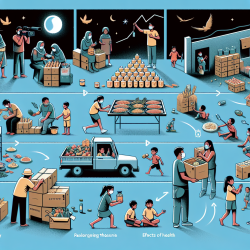Introduction
The COVID-19 pandemic has challenged us in unprecedented ways, bringing to light the importance of individual behaviors in collective health outcomes. A recent study titled Practicing Social Isolation During a Pandemic in Brazil: A Description of Psychosocial Characteristics and Traits of Personality During COVID-19 Lockout provides valuable insights into how personality traits influence compliance with social isolation measures. As practitioners focused on creating positive outcomes for children, understanding these insights can help us tailor interventions that are both data-driven and impactful.
Key Findings from the Research
The study conducted in Brazil during the early months of the pandemic evaluated psychological and sociodemographic characteristics associated with compliance to social isolation. The findings revealed that individuals who adhered to governmental recommendations exhibited lower levels of neuroticism and conscientiousness, experienced less stress, anxiety, and depression, and reported more positive affect. These individuals also reframed stress in a more positive manner compared to others.
Conversely, those who practiced social isolation to avoid infecting others were generally younger, single, and had higher levels of education. They displayed higher neuroticism levels and lower conscientiousness, aligning with international literature suggesting that individuals higher in neuroticism tend to avoid risks.
Implications for Practitioners
Understanding these personality traits can be instrumental in designing interventions for children. Here’s how practitioners can apply these findings:
- Personalized Interventions: Tailor interventions to align with the personality traits of children. For instance, children exhibiting higher neuroticism may benefit from stress-reduction strategies that focus on positive reframing.
- Promoting Pro-social Behaviors: Encourage behaviors that promote social commitment, such as cooperation and empathy, which can be particularly beneficial in a classroom setting.
- Stress Management Techniques: Implement stress management techniques that help children view stress as a challenge rather than a threat, fostering resilience.
Encouraging Further Research
While the study provides a foundational understanding, further research is needed to explore these dynamics in different cultural contexts and age groups. Practitioners are encouraged to engage in interdisciplinary research to deepen our understanding of how personality traits influence compliance with health behaviors, especially in children.
Conclusion
The insights from the Brazilian study highlight the significant role of personality traits in health compliance behaviors. By integrating these findings into practice, we can enhance our interventions and support children in developing resilience and pro-social behaviors during challenging times.
To read the original research paper, please follow this link: Practicing Social Isolation During a Pandemic in Brazil: A Description of Psychosocial Characteristics and Traits of Personality During COVID-19 Lockout.










